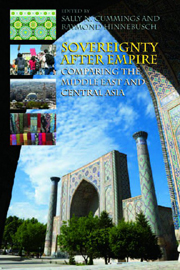Book contents
- Frontmatter
- Contents
- Acknowledgments
- Notes on the Contributors
- 1 Introduction
- SECTION I Histories of Empire and After
- SECTION II Paths to Sovereignty: Views from the Core and Periphery
- SECTION III Empire and Domestic Sovereignty
- SECTION IV Empire and Popular Sovereignty
- SECTION V Empire and External Sovereignty
- 13 Empire and State formation: Contrary Tangents in Jordan and Syria
- 14 Rentierism, Dependency and Sovereignty in Central Asia
- 15 Tajikistan: From de facto Colony to Sovereign Dependency
- 16 Conclusions
- Bibliography
- Index
14 - Rentierism, Dependency and Sovereignty in Central Asia
from SECTION V - Empire and External Sovereignty
Published online by Cambridge University Press: 12 September 2012
- Frontmatter
- Contents
- Acknowledgments
- Notes on the Contributors
- 1 Introduction
- SECTION I Histories of Empire and After
- SECTION II Paths to Sovereignty: Views from the Core and Periphery
- SECTION III Empire and Domestic Sovereignty
- SECTION IV Empire and Popular Sovereignty
- SECTION V Empire and External Sovereignty
- 13 Empire and State formation: Contrary Tangents in Jordan and Syria
- 14 Rentierism, Dependency and Sovereignty in Central Asia
- 15 Tajikistan: From de facto Colony to Sovereign Dependency
- 16 Conclusions
- Bibliography
- Index
Summary
Twenty years after becoming independent states, all five Central Asian republics can be broadly characterized as either rentier or semi/quasirentier states. The “classic” rentier states – Kazakhstan and Turkmenistan – rely on rent (wealth) derived directly from the sale of oil and gas. Kyrgyzstan and Tajikistan rely on rent from a combination of indirect taxation on labor remittances from Kazakhstan and Russia, international aid, the leasing of access to their territory and the drug trade. Uzbekistan, relying heavily on the sale of cotton, gold and gas on the international market, along with labor remittances and to a lesser degree leasing access to territory, falls somewhere in between. The economic composition of the Central Asian region, which began taking its current shape with the unprecedented increase in oil prices at the beginning of 2000s, has started to mirror the Middle Eastern-style “division of labor” that developed between oil-rich Gulf and oil-poor Arab countries, as well as Pakistan and other states which have remained greatly dependent on labor remittances earned in the oil-rich states.
The dependency of the Central Asian republics on rent has a far-reaching impact on these countries' foreign policies, their relationship with Russia and state sovereignty. In the case of Kazakhstan and Turkmenistan, the lack of viable alternatives to oil and gas exports and full dependency – until very recently – on the Russian-controlled pipeline system, have substantially narrowed their room for maneuver and allowed Russia to maintain the upper hand in its relationship with Central Asian oil and gas exporters.
- Type
- Chapter
- Information
- Sovereignty after EmpireComparing the Middle East and Central Asia, pp. 282 - 303Publisher: Edinburgh University PressPrint publication year: 2011



